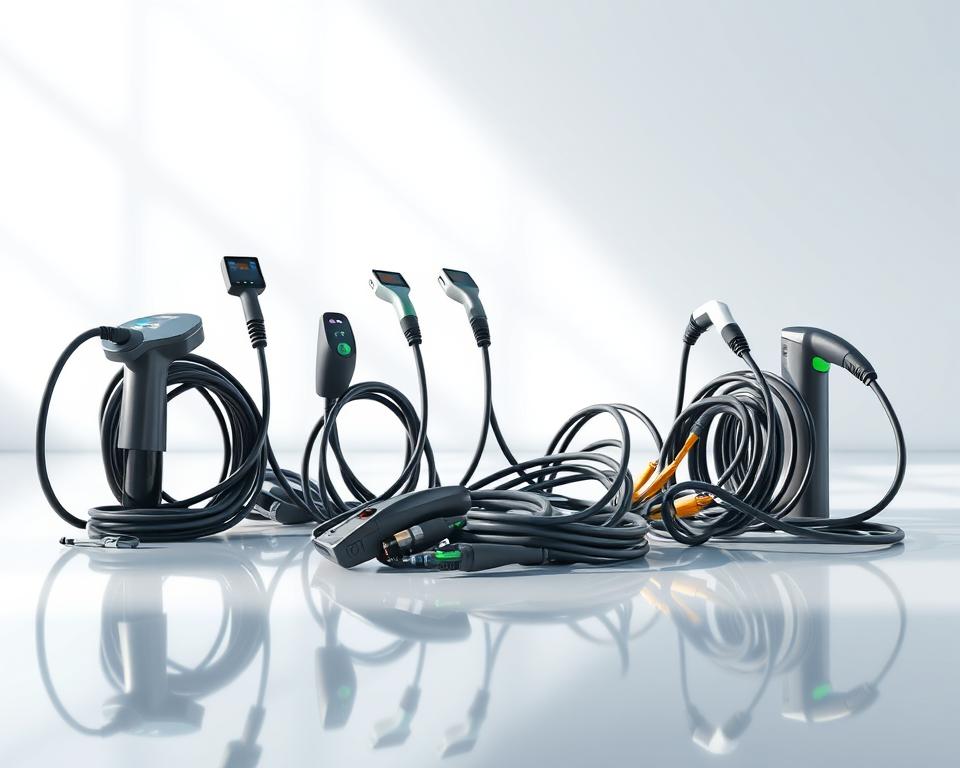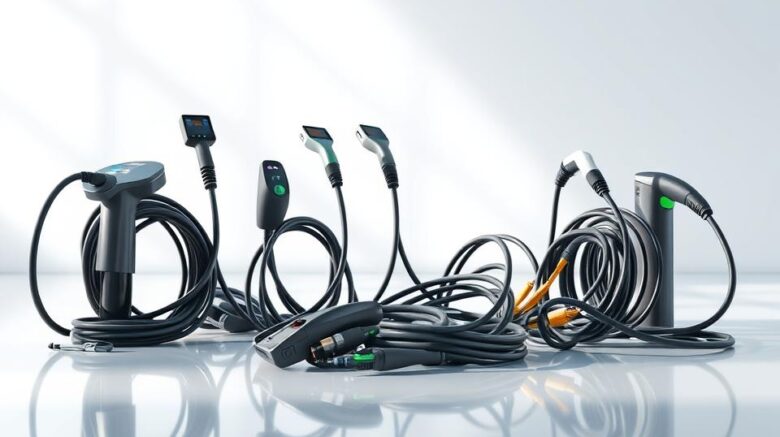Leading EV Charging Cable Manufacturers for Your Electric Vehicle
EV adoption is booming, with the demand for dependable and fast charging solutions increasing sharply. As of now, industry leaders have been at the vanguard of this change, providing top-tier charging infrastructure. Southwire, for instance, has been a significant player since 2014, garnering 1000+ five-star reviews and a 75-year legacy in electrical construction.
The rise in electric vehicle adoption necessitates the need for durable, rapid, and secure EV Charger Manufacturers. Top manufacturers are innovating to meet these evolving needs, offering products that boost the overall charging experience.
Knowing the differences between various charging solutions is essential for selecting wisely. Quality charging infrastructure directly influences vehicle performance and customer satisfaction.
Notable Observations
- Leading brands provide premium cables that boost durability and security.
- EV market expansion drives need for high-efficiency chargers.
- Top brands pioneer solutions for changing EV requirements.
- Premium cables enhance both charge rate and vehicle function.
- Investing in quality charging infrastructure is beneficial in the long run.

The Growing Importance of Quality EV Charging Cables
With EVs on the rise, the importance of top-grade EV charging cables cannot be overstated. The efficiency, safety, and dependability of electric vehicle charging systems rest on the quality of the charging cables used.
How EV Charging Tech Has Advanced
Electric vehicle charging technology has undergone significant advancements in recent years, with a shift toward speedy charge times and improved safety features. Modern EV charging cables are built for these requirements, incorporating superior materials and construction techniques to minimize power loss and maximize charging efficiency.
The Case for Premium Charging Infrastructure
Premium cables enhance both safety and functionality in EV systems. Robustness, such as weather resistance and flexibility in extreme temperatures, maintain performance in harsh conditions. Moreover, meeting standards and adherence to industry guidelines are crucial in guaranteeing safe operation.
| Key Features | Benefits |
|---|---|
| Superior materials and construction | Minimized power loss during energy transfer |
| Enhanced durability features | All-weather reliability |
| Standards adherence | Rigorous safety requirements met |
| Maintainability | Long-term value proposition, reduced waste |
Our high-performance cable solutions, such as those offered by Aichie Tech Electronics, are tested for quality and compliance in The Cable Lab. By opting for serviceable Portable EV Charger Manufacturer, repairable designs reduce lifetime costs, reducing waste and protecting the planet.
Premier Chinese EV Cable Suppliers
China is home to a growing number of EV charging cable manufacturers. These companies are crucial in supporting the expanding electric vehicle (EV) market, providing high-quality automotive cables designed for various charging needs.
Wottz – Pioneers in EV Cables Since 2014
Wottz has been a leading cable manufacturer since 2014. They offer a range of cables that meet the specific requirements of EV charging systems, including Mode 1, 2, 3, and DC Fast Charging (Mode 4).
Aichie Tech Electronics – 75 Years in Electrical Solutions
Aichie Tech Electronics’ seven-decade legacy informs its premium cable designs. Their products are built for residential and commercial applications.
Additional Key Cable Suppliers
Beyond industry leaders like Wottz and Southwire, other manufacturers are making their mark by focusing on specific automotive applications or technological innovations in electric vehicle charging. These include Type 1 & 2 connector experts, as well as companies developing cables with enhanced flexibility and resistance to environmental factors.
A Guide to EV Cable Types
As electric vehicles become increasingly popular, understanding the various types of EV Charging Cables is crucial for optimal charging experiences. Different cables suit different charging needs. The diversity in EV charging infrastructure demands a closer look at the cable options.
Comparing SAE J1772 and Mennekes Cables
Type1 and Type2 charging cables are two common standards used for EV charging. Type 1, also known as SAE J1772, is predominantly used in North America, while Type 2, or Mennekes, is the standard in Europe. The right cable matches your car and charger. Type 2 cables often support higher charging capacities, making them ideal for speed.
AC Level2 vs DC Fast Charging
Level 2 AC cables charge faster, up to 19.2 kW. DC Fast Charging cables, on the other hand, enable quick top-ups by on-site AC→DC conversion, delivering rapid fill-ups. These cables are essential for long-distance EV travel, letting EVs charge in minutes.
Portable vs Fixed Cables
Granny chargers plug into home outlets for emergency use. Tethered cables are attached permanently, offering ease at the cost of portability. The choice comes down to flexibility vs convenience.
When selecting an EV charging cable, factors such as cable length, charging speed, and compatibility with the vehicle are crucial. For instance, portable charging cables range from basic Level1 emergency chargers to more robust Level2 solutions. Vehicle-to-load (V2L) cables let EVs act as mobile power banks.
- Portable charging cables offer flexibility, with options ranging from basic to more robust Level2 solutions.
- Fixed cables add convenience, removing cable management tasks.
- Cable length is a critical consideration, with options ranging from 5-meter standard cables to 50-meter extended cables.
Essential EV Cable Characteristics
Premium cables stand out for durability, safety, and performance. These features are crucial for maintaining the integrity of the charging process and safeguarding the vehicle and user.
Robustness and Weatherproofing
Cables must withstand rain, sun, and cold. Manufacturers like Wottz and Southwire craft their cables from recyclable materials that adhere to ROHS compliance, ensuring they withstand various environmental conditions. Their serviceable design facilitates easy maintenance and promotes recycling.
Flexibility and Ease of Use
Flexibility and ease of use are also critical factors. High-quality EV charging cables are built for easy handling without sacrificing strength. This flexibility does not compromise their durability, as they are built to withstand regular use.
Regulatory Approvals
Approved safety marks ensure reliable performance. They ensure their products meet or exceed standards such as IEC62196 for connectors and UL2594 in North America. Rigorous third-party testing evaluates electrical safety, mechanical durability, and environmental resistance.
| Certification | Description | Region |
|---|---|---|
| IEC62196 | Connector safety standards | International |
| UL2594 | Standard for electric vehicle supply equipment | North America |
| ROHS | Restriction of hazardous substances | International |
By focusing on these key features, manufacturers can provide EV charging cables that not only meet the highest quality and safety standards but also enhance the overall user experience.
Innovative Technologies from Leading EV Charging Cable Manufacturers
The latest developments in EV charging cable technology are revolutionizing the way we charge our vehicles, with a focus on ultra-fast charging, improved signal integrity, and eco-friendly materials.
Liquid-Cooled Charging Cables for Ultra-Fast Charging
Liquid-cooled charging cables are emerging as a key technology for ultra-fast charging, minimizing thermal throttling during high-power sessions.
Advanced Connector Tech
Hyperboloid contacts are being integrated into EV charging cables to enhance signal integrity, ensuring stable communication and power flow.
Green Charging Cable Designs
Leading manufacturers are prioritizing sustainability in their cable designs, minimizing ecological footprint with RoHS-compliant, serviceable builds. For instance, companies like Aichie Tech Electronics and Wottz are adopting serviceable design philosophies and RoHS compliance to minimize waste and promote recycling.
Programs for cable recycling, non-toxic compounds, and TPU sheaths mark the eco shift.
Choosing the Perfect EV Cable
Selecting the proper cable ensures optimal performance. To make an informed decision, consider several key factors.
Compatibility with Your Electric Vehicle Model
Ensure the charging cable is compatible with your vehicle’s connector type. Your vehicle’s onboard charger capacity determines the maximum AC charging rate it can accept.
Length Considerations
Choose a cable length that suits your charging needs. A longer cable provides more flexibility but may be heavier and less manageable.
Power Rating & Charge Rate
Match your cable’s power handling to your vehicle’s capabilities. Standard Level 2 home charging operates at 7.2 kW, but some vehicles support up to 19.2 kW with appropriate electrical service.
Mind these points to pick a cable that fits your EV lifestyle.
Why Choose Premium Charging Solutions
With EV growth unabated, premium cables are essential. Choosing cables from Wottz or Aichie Tech Electronics provides long-term value and reliability. Their serviceable designs enable repairs over replacements to cut waste. This approach aligns with the core values of electric vehicle ownership by promoting sustainability.
Selecting top-grade infrastructure prepares you for next-gen charging.
